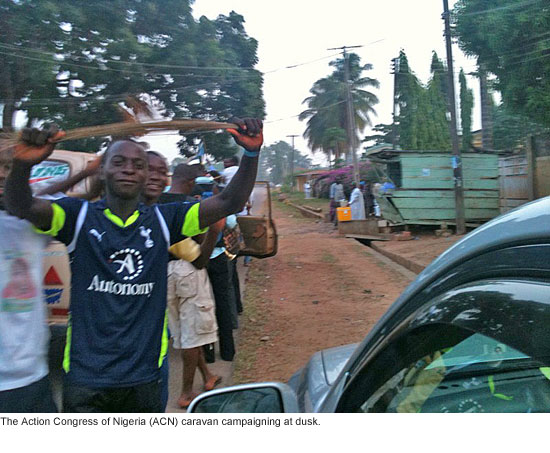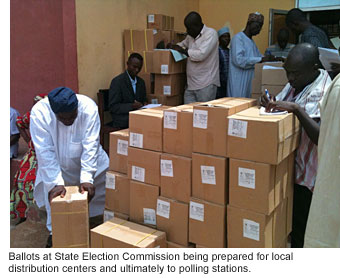On the eve of the vote [updated]
April 8, 2011
 Tomorrow is Election Day in Nigeria.
Tomorrow is Election Day in Nigeria.
So today I’m crisscrossing the capital city of Nigeria’s Kwara state, Ilorin, with my partner, Jennifer Cooke, of the Washington-based Center for Strategic Studies. We’re visiting political party officials, journalists, the election commission chairman for Kwara state (who’s got a big job), and local government officials, among others.
Our goal is to gather as much intelligence and ground-based information as we can on what folks think will happen when Nigerians head to their polling places on Saturday. We want to know where, if anywhere, trouble or problems are expected. Jennifer, John (our local chaperone) and I will aggregate that information tonight and chart our observation route. We’ll hit the road at dawn, visiting polling places to observe how the process is working, including whether ballots and other vital election materials have arrived on time and whether people are able to check in and vote without any major hiccups.
As we work through our route, we’ll also decide what specific polling station we’ll track to the next level—the regional tabulation center, which is the equivalent of our voter registrar’s office—to make sure the counts are the same in both locations.
All this is a time consuming and physically taxing process, and we’ve gotten little sleep. The good news is that Jennifer is a sub-3:20 marathoner and I do my share of running, too. So our stamina is holding up in the tropical heat.
(A sidebar to all this is that Jennifer was scheduled to run the Boston marathon the week after next, but she’s staying in Nigeria to monitor the postponed Presidential balloting a week from tomorrow. Now, that’s commitment to Nigerian democracy.)
A few observations of Ilorin and its environment:
Nigeria is one of the poorest nations on the globe, and that was evident on our drive in from the airport. For the vast majority of locals, life is rudimentary at best. By our standards, one would characterize the population as economically poor. We are told that there’s a small but growing middle class, but it’s hardly noticeable. Then there’s the large concentration of wealth in the hands of a few. Their homes, or estates, would be the envy of Beverly Hills or Bel Air. Incredibly, one home has its own mosque on the front of the property.
In much the same way that race influences interpersonal relations in the U.S., religion and tribal rivalries can often divide Nigerians. Kwara state is majority Moslem with a significant, but decidedly minority, Christian population. There are two tribes that dominate here—the Yoruba and the Hausa-Fulani. Their languages are distinct and utterly unrelated to each other. There’s no reticence of either to stereotype the other.
This sort of thing always makes me nervous because of where it can lead. Those of us who are old enough to remember can recall the civil war with Biafra in the late 1960′s, when tens of thousands civilians were killed and millions of the defeated Igbo tribe were rendered refugees.
In short, this election represents another threshold moment in the evolution of civilian and democratic government in this, Africa’s most populous nation. No one expects the election will go perfectly. Few ever do in emerging democracies. It will be a success, though, if there’s a marked improvement over the last three national elections in 1999, 2003 and 2007. Success will be an election with minimal violence and a credible result, based on a smooth and transparent process that allows Nigerians to elect and believe they have elected candidates of their own choosing.
If Nigeria can pull this off, it will help build public confidence in the institutions vital to any sustainable democracy. This is a building block in the construction of that democracy. They have a long way to go, but there are a lot of Nigerians determined to get there.
You will next hear from me after the election, most likely after the National Democratic Institute has debriefed its observers back in the Nigerian capital, Abuja, on Sunday and Monday. Then, I’ll be headed home to turn my attention back to our own county and my new granddaughter.10
Updated 4/8, 10 p.m.: Sadly, a bomb exploded Friday at the Independent National Electoral Commission office in Suleja in central Nigeria, according to media reports, including this one from CNN. Eight people reportedly died in the attack, the latest in a series of violent acts aimed at derailing democracy in Nigeria.
In Kwara state, where I’m observing the national elections, there has been no reported violence or a history of the kind of deadly attacks that have erupted elsewhere during the past two days. So forward we move.
Photos from Supervisor Zev Yaroslavsky
Posted 4/8/11




















 405 bridge work causes a stink
405 bridge work causes a stink





